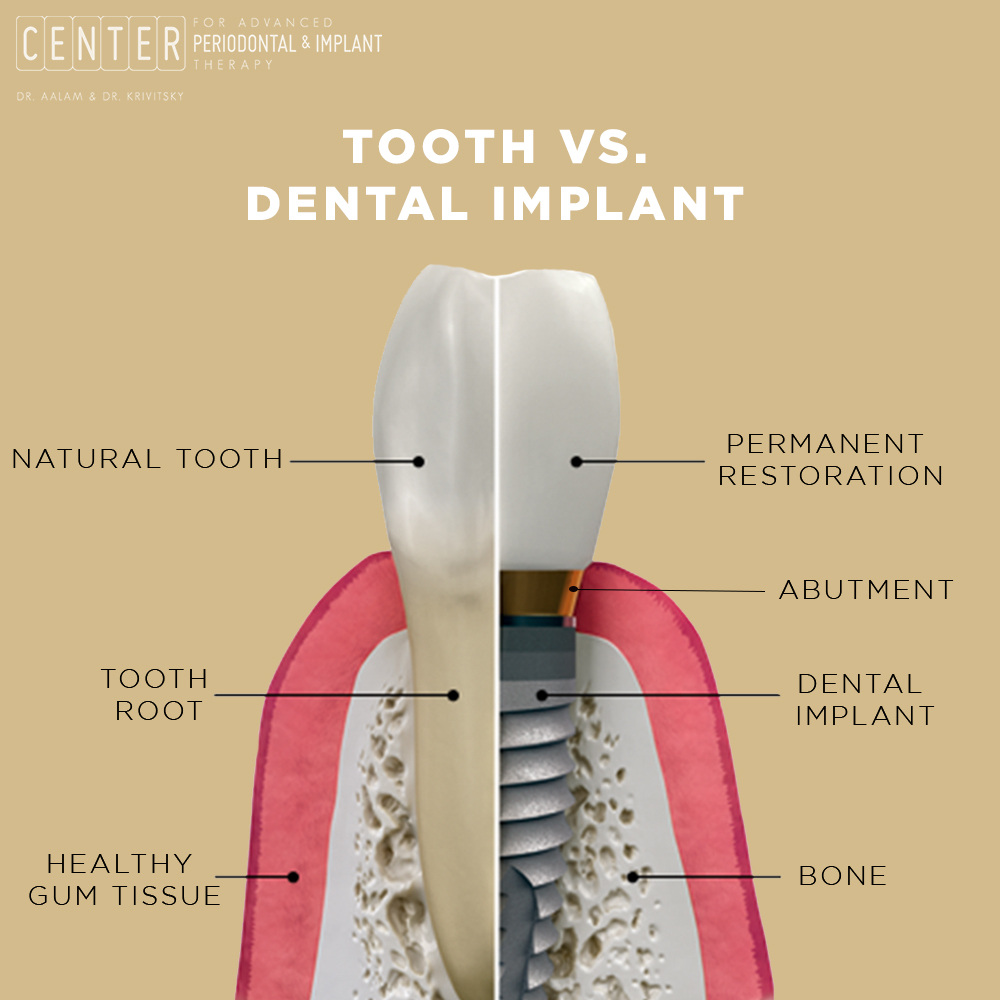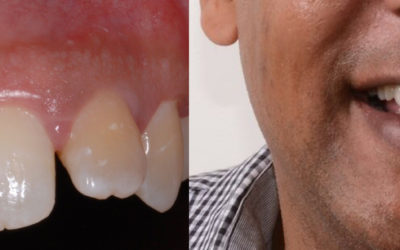Top Questions Patients Ask About Dental Implants
Dental health care has come a long way with the development of modern dental implant therapy. And although today’s dental implants are extremely popular, there are still a lot of questions and misconceptions about the treatment process. Here are some of the most common dental implant FAQs we hear in our Los Angeles periodontist’s office.
What is a dental implant?
A dental implant is essentially an artificial tooth root, typically crafted from materials like Titanium or Zirconia. Surgically positioned within the jawbone, it’s placed adjacent to natural teeth. Over time, the implant undergoes a process of fusion with the surrounding bone. Once this integration is achieved, a crown, bridge, or full-arch prosthesis is affixed to it, offering a restoration that completes your smile and feels and functions much like natural teeth. Unlike other dental solutions, these implants provide a permanent fixture, ensuring a confident and natural experience without the concern of removal.
Are dental implants expensive?
Dental implants may seem more expensive than alternatives like partial dentures or fixed bridges. However, their durability and long-lasting nature often make them a more economical choice over time.
How much do dental implants cost?
The cost of dental implants can vary widely, as every patient’s case is unique. Factors such as the overall health of a patient’s mouth, the number of implants required, and specific dental needs can all influence the final price.
It’s essential to understand that each individual’s situation, from the condition of their jawbone to the presence of any oral diseases, can have a direct impact on the cost. While general price ranges are available, it’s always best to consult a dental professional for a precise estimate. We recommend reaching out to The CENTER for Advanced Periodontal & Implant Therapy, where our specialists can provide a detailed assessment based on a comprehensive examination of your unique circumstances.
Who can get dental implants?
Dental implants are suitable for most adults in good general health and have sufficient jawbone density to support the implant. However, the appropriateness of dental implants varies from person to person. Factors that may influence one’s eligibility include:
- Oral Health: Individuals with healthy gums and a lack of periodontal disease are ideal candidates. Conditions such as gum disease might need to be treated before implantation.
- Jawbone Density: For the implant to secure properly, there must be adequate bone density. If bone loss has occurred, procedures like bone grafting might be necessary before implant placement.
- Overall Health: Patients with chronic conditions like diabetes or heart disease need to be evaluated individually. Proper management of these conditions is crucial.
- Tobacco Use: Smoking can impede the healing process, so smokers may face higher risks for implant complications.
- Radiation Therapy: Individuals who have had radiation therapy in the head or neck region may not be suitable candidates.
It’s important to note that age is not necessarily a deterrent for dental implants. Once their facial growth is complete, both older adults and younger patients can benefit from them.
It’s best to have a comprehensive consultation with a dental specialist, such as at The CENTER for Advanced Periodontal & Implant Therapy, who can provide personalized advice and evaluations based on your oral and overall health.
Are dental implants safe?
Yes, dental implants are considered safe when performed by trained and experienced dental professionals. Over the past few decades, dental implant technology and techniques have advanced significantly, making the procedure highly predictable with a high success rate.
Several factors contribute to the safety of dental implants:
- Materials Used: Dental implants are typically made of biocompatible materials like Titanium or Zirconia, which are accepted well by the body and have a low risk of causing allergic reactions or rejection.
- Thorough Evaluation: Before undergoing the procedure, patients are thoroughly assessed to ensure they are suitable candidates. This includes evaluating oral health, jawbone density, and overall health.
- Sterile Techniques: Dental professionals employ strict sterilization and hygiene practices during the implantation process to minimize the risk of infection.
- Post-Operative Care: Proper aftercare, as advised by the dental professional, is crucial to avoid complications and ensure the successful integration of the implant.
However, like any surgical procedure, there are inherent risks. Potential complications can include infection at the implant site, injury to surrounding structures, implant failure, and nerve damage. It’s essential to choose a reputable and experienced dental practice to minimize these risks. Regular follow-ups and maintaining good oral hygiene further enhance the safety and success of dental implants.
How many implants will I need?
The number of dental implants required varies depending on individual needs and specific circumstances. Here are some general scenarios:
- Single Missing Tooth: If you are missing just one tooth, typically, only one dental implant is required to replace the root of that tooth, which will then support a single crown.
- Multiple Missing Teeth: If you’re missing several consecutive teeth, you may not necessarily need an implant for each missing tooth. For instance, a bridge replacing three teeth might be supported by just two implants.
- Full Arch Replacement: For individuals missing all their teeth in one or both jaws, the number of implants needed will depend on the chosen replacement method. Traditional full dentures might require anywhere from four to eight implants per arch, while some systems, like “All-on-4,” utilize just four implants to support a full arch of teeth.
- Bone Density and Volume: The condition of your jawbone can also influence the number of implants. If the bone density isn’t adequate in certain areas, additional implants may be placed to evenly distribute the load of the prosthetics.
- Individual Treatment Plan: Other considerations, such as the type and design of the prosthesis, the patient’s bite, and aesthetic concerns, can also influence the number of implants.
It’s essential to have a thorough consultation with a dental implant specialist who can assess your specific situation and provide a tailored treatment plan detailing the number of implants best suited for your needs.
Is dental implant surgery painful?
Dental implant surgery is usually performed under local anesthesia, ensuring a pain-free procedure. For those who may be anxious or wish for deeper relaxation, sedation dentistry is also an option. After the anesthesia or sedation wears off, patients might experience some mild discomfort, swelling, or bruising. These post-operative symptoms are typically short-lived and can be managed with over-the-counter pain relievers or prescribed medications. Following post-operative instructions is crucial for a smooth recovery. In short, while the surgery itself is comfortable, especially with sedation options for dental implants, some manageable discomfort might be expected during the healing phase.
Are implants really better than dentures or bridges?
Yes. Dental implants offer distinct advantages. Unlike bridges, they don’t necessitate modifying the structure of neighboring natural teeth. Moreover, unlike dentures or partials, they are fixed in place and don’t need to be removed. Dental implants closely replicate the appearance and function of natural teeth, providing a more authentic and comfortable experience.
Can I eat whatever I want if I have dental implants?
Once dental implants have fully integrated with your jawbone and the healing process is complete, they function like natural teeth, allowing you to eat a wide range of foods. In the initial stages after implant surgery, it’s essential to stick to softer foods and avoid any hard, crunchy, or sticky items to ensure proper healing and prevent any unnecessary stress on the implant site.
However, once the healing phase is over:
- Strength and Functionality: Dental implants are designed to be strong and durable, enabling you to bite and chew with confidence.
- Varied Diet: You can enjoy a diverse diet, including crunchy fruits, vegetables, and even tougher meats.
- Cautionary Note: Even though implants are resilient, it’s always a good idea to exercise caution when eating extremely hard or sticky foods. Just as with natural teeth, there’s a risk of damage when subjected to excessive force.
Regular dental check-ups and proper oral hygiene are crucial to ensure the longevity of your implants and overall oral health. In summary, while dental implants restore most of your natural chewing ability, being mindful of exceptionally hard or challenging foods is advisable.
How long do dental implants last?
As long as you care for them properly and don’t develop peri-implantitis (the implant form of gum disease, which is preventable), your dental implants can last the rest of your life. Their remarkable durability and high success rate set them apart as a leading choice over other tooth replacement options.

Do dental implants work like natural teeth?
Absolutely. Dental implants are anchored within the bone, mimicking the foundation of natural teeth. Crowns or bridges, which resemble the size and shape of actual teeth, are attached to these implants. This design makes them stand out as a unique and highly effective tooth replacement option.
Is it hard to take care of dental implants?
Not at all. These dental restorations are extremely easy to maintain. Simply brush and floss around the dental implant structure and plan regular checkups with our Los Angeles periodontist every six months. Plan to treat each dental implant as if it were an original part of your smile.
What are dental implants made out of?
Most dental implants are crafted from titanium, a hypoallergenic metal known for its compatibility with oral tissues and its ability to promote bone growth and integration post-installation. Additionally, ceramic Zirconia implants offer a holistic alternative to traditional metal implants and are gaining popularity.
Can I get dental implants if I already wear dentures?
Absolutely. Many individuals who wear dentures opt for dental implants for added stability and comfort. Dental implants can be used in a few different ways for denture wearers:
- Implant-Supported Dentures: Instead of traditional dentures that rest on the gums, these dentures snap onto implants that have been surgically placed into the jawbone. This ensures a secure fit, preventing the dentures from slipping or causing discomfort.
- Full Arch Replacement: For those looking for a fixed solution, multiple dental implants can be placed to support a full arch of non-removable teeth.
- Hybrid Solution: Some patients may choose a combination of removable and fixed prosthetic options based on their needs and preferences.
Not only can denture wearers consider dental implants, but many find them to be a significant upgrade in terms of comfort, function, and aesthetics.
How many types of dental implants are there?
Traditional dental implants are the most common type of dental implant design. These restorations are about the same width and length as an anatomical tooth root. There are also “mini” dental implants, which are about half that size. Mini implants can be installed in spaces where there is thin bone or inadequate spacing for a full implant. And then there are zygomatic dental implants, which are used when there is significant bone loss or bone grafts are not an option.
What is involved in dental implant placement?
Under the esteemed guidance of Dr. Aalam and Dr. Krivitsky, the CENTER offers a comprehensive and patient-centered approach to dental implant placement:
- Initial Consultation: At your first visit, our team will conduct a thorough evaluation using state-of-the-art imaging technology. This ensures we understand your oral health and can devise the most suitable treatment plan for you.
- Bone Grafting (if required): If there’s a need to enhance bone health, our specialists will recommend bone grafting procedures, using either bone from another region of your body or high-quality grafting materials.
- Expert Implant Placement: With precision and care, the dental implant is surgically placed in the jawbone, ensuring optimal outcomes.
- Osseointegration: A critical phase where the bone and implant bond together; this process can span several months. You’ll be provided with care instructions to aid successful integration.
- Abutment and Crown Integration: Once osseointegration is complete, an abutment is attached, followed by a custom-designed crown, bridge, or denture to match your natural teeth.
- Dedicated Follow-up: Your journey doesn’t end post-surgery. Regular check-ups at the CENTER ensure the longevity and health of your implant.
At the CENTER for Advanced Periodontal & Implant Therapy, with the expertise of Dr. Aalam and Dr. Krivitsky, you’re ensured a seamless experience and a lasting solution for tooth replacement.
Implant Dentistry in Los Angeles
If you have missing teeth because of tooth decay, gum disease, or past oral trauma, The CENTER for Advanced Periodontal & Implant Therapy can help make your smile whole again. This straightforward surgical procedure is simpler than you probably thought. Contact our Los Angeles implant surgery clinic today to reserve a no-obligation evaluation.
You May Also Like...
Elevating Dental Implant Standards in Los Angeles for Patient Safety
Sarah's Implant Journey: A Testament to Transformation Meet Sarah. Three years ago, Sarah avoided mirrors, rarely...
Comparing Immediate Load vs. Traditional Dental Implants
Dental implants have revolutionized the way we replace missing teeth. They're not just prosthetics; they restore the...
Overcoming Dental Anxiety for Fear-Free Dental Implants
Dental anxiety is a common concern shared by many patients. It's not just about the fear of pain; it's also about the...



